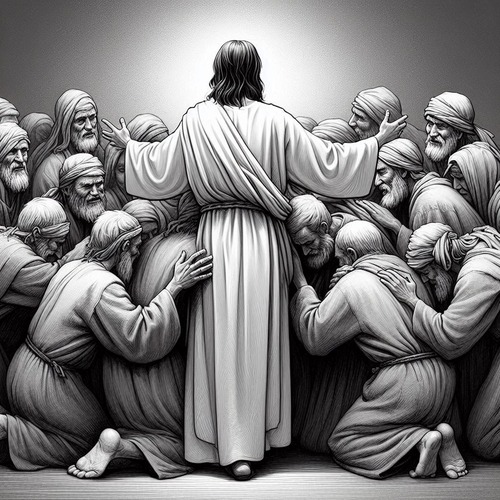Christian Joy: Is It a Personal Choice or a Feeling? Or Neither?
In our modern culture, joy is often portrayed as either a positive emotion we stumble upon or a mindset we can simply choose. We’re told to “choose joy” as if it were merely a matter of willpower, or to “follow your bliss” as if joy were just a feeling to be chased. But does this align with the biblical understanding of Christian joy? What does Scripture actually teach about the nature of joy, and what wisdom can we glean from the Reformed tradition?
BEYOND EMOTIONS AND DECISIONS
Christian joy, properly understood, transcends both feeling and choice. It is deeper, more enduring, and has its roots in something—or Someone—far greater than our emotional states or decisions.
The Apostle Paul commands us to “Rejoice in the Lord always; again I will say, rejoice” (Philippians 4:4). Notice this is a command—suggesting an element of choice—but it’s a command to rejoice specifically “in the Lord.” Christian joy isn’t self-generated but God-centred. It flows from our relationship with Christ and our understanding of His work on our behalf.
JOY IS A SOVEREIGN GIFT
From a Reformed perspective, true Christian joy is primarily a sovereign gift from God rather than a product of human will or emotion. It’s listed among the “fruit of the Spirit” in Galatians 5:22-23, indicating it comes from the Holy Spirit’s work within us, not from our own efforts.
The Psalmist acknowledges the divine source: “You have put more joy in my heart than they have when their grain and wine abound” (Psalm 4:7). This joy isn’t something we manufacture but something God places within us.
John Calvin writes in his commentary on Philippians: “This joy is not earthly or carnal, which depends on fading things of this world, but is spiritual, having its foundation in the benefits of Christ.”
JOY IN THE MIDST OF SUFFERING
Perhaps the most striking evidence that Christian joy isn’t merely a feeling or choice is its persistent presence even in the midst of suffering. James instructs believers to “Count it all joy, my brothers, when you meet trials of various kinds” (James 1:2). This paradoxical command makes little sense if joy is simply an emotion or a choice disconnected from theological reality.
The early church demonstrated this supernatural joy when, after being beaten for preaching the gospel, the apostles left “rejoicing that they were counted worthy to suffer dishonour for the name” (Acts 5:41). Such joy has nothing to do with our circumstances, and everything to do with its Giver. This joy defies natural explanation and points to its divine origin.
In his Institutes, Calvin observes: “The believer’s joy is never complete or perfect in this world; it is often interrupted, dampened, and obscured by the many afflictions with which this life is filled. Yet it remains unvanquished, for it rests not on the shifting sands of circumstance but on the solid rock of God’s unfailing goodness.”
THE ROLE OF HUMAN RESPONSE
While joy is fundamentally a gift, the Reformed tradition doesn’t negate human responsibility in cultivating it. We’re called to “work out our salvation with fear and trembling,” even as we recognise “it is God who works in you, both to will and to work for his good pleasure” (Philippians 2:12-13).
We nurture this God-given joy through the means of grace—Scripture, prayer, worship, and fellowship. The Psalmist declares, “Your testimonies are my heritage forever, for they are the joy of my heart” (Psalm 119:111). As we immerse ourselves in God’s Word and commune with Him in prayer, the joy He has planted within us grows and flourishes.
Here’s how Charles Spurgeon beautifully expressed this balance: “There is a marvellous medicinal power in joy. Most medicines are distasteful; but this, which is the best of all medicines, is sweet to the taste, and comforting to the heart. This joy, which is the fruit of the Spirit, bears a close relationship to faith. Joy is the sweet companion of faith.”
CONCLUSION
Christian joy, then, is neither merely a personal choice nor simply a feeling. It’s fundamentally a sovereign gift from God, rooted in the objective realities of His character and work. It’s a joy that persists even in suffering because its foundation isn’t in changing circumstances but in the unchanging God.
As believers, we don’t simply “choose joy” through sheer willpower, nor do we passively wait for joyful feelings. Instead, we receive joy as God’s gift, nurture it through the means of grace, and express it in faithful obedience—all while recognising that both the gift and our response to it come from God’s gracious work in our lives.
As Paul reminds us, our ultimate hope is that God Himself, “the God of hope,” will “fill you with all joy and peace in believing, so that by the power of the Holy Spirit you may abound in hope” (Romans 15:13).
CHRISTIAN JOY: RELATED FAQs
Can Christians experience joy while battling depression or anxiety? Yes, Christian joy can coexist with mental health struggles. This theological joy exists at a deeper level than emotional happiness and can be present even when emotions are troubled. Professional help for mental health challenges is compatible with trusting God as the source of true joy.
- How does the Reformed view of joy differ from the prosperity gospel’s understanding? We root joy in God’s character and salvation rather than in material blessings or circumstances. Prosperity teaching often equates joy with material success, while Reformed theology sees joy as possible even in material lack or suffering.
- Is it wrong for Christians to pursue activities that bring emotional happiness? Not at all—God gives good gifts to be enjoyed. The key distinction is that while emotional happiness from legitimate pleasures is good, it shouldn’t become our ultimate source of joy. Christian joy transcends but doesn’t eliminate normal human pleasures.
How does corporate worship contribute to Christian joy? Corporate worship nurtures joy by reminding us we’re part of God’s covenant community. When we gather with other believers to praise God, we participate in a foretaste of heavenly joy. The Reformed tradition particularly emphasizes how Word and Sacrament minister joy to believers.
- What role does Christian assurance play in experiencing joy? Assurance of salvation provides a foundation for deep, abiding joy. As believers grasp the certainty of God’s promises through faith, joy naturally follows. This connection between assurance and joy is why Reformed pastors often emphasise the doctrines of grace.
- How should Christians respond when they don’t feel joyful? When joy seems absent, believers should examine whether sin is hindering their spiritual life, while also resting in God’s faithfulness rather than their feelings. The Reformed tradition encourages turning to Scripture, prayer, and Christian community during spiritual dry spells. Remember that even Jesus experienced sorrow, showing that emotional fluctuations are part of human experience.
Does the Reformed emphasis on human sinfulness diminish Christian joy? Quite the opposite—a deep understanding of sin actually enhances joy by magnifying the wonder of grace. When we grasp how serious our condition was, our joy in Christ’s saving work becomes all the more profound. This is why Reformed worship often includes both confession of sin and celebration of forgiveness.
CHRISTIAN JOY: OUR RELATED POSTS
Editor's Pick

Sacred Sorrow: Why Jesus Calls Mourning a Blessing
MAKING SENSE OF THE DIVINE PARADOX IN MATTHEW 5:4 When Jesus declared, “Blessed are those who mourn, for they will [...]

‘Sell Everything You Have…’: Are We To Do So Literally?
When Jesus encountered the rich young ruler in Matthew 19:21, His words cut through with startling clarity: “If you want [...]

Why Jesus Said ‘It’s Better I Go Away’…
THE SUPERIOR GIFT OF THE HOLY SPIRIT “Nevertheless, I tell you the truth: it is to your advantage that I [...]

What About Those Who’ve Never Heard the Gospel?…
WILL GOD SHOW THEM MERCY ON JUDGEMENT DAY? Few questions tug at the Christian’s heart like this one. Picture the [...]

Cities of Refuge: Foreshadowing Our Safe Haven in Jesus
Picture this: A man is chopping wood with his neighbour when the axe head flies off the handle, striking and [...]

Testament to Design: The Engineering Marvel of Elephants
Picture an African elephant delicately plucking a single acacia leaf with the tip of its trunk, then moments later using [...]

Blue Whales: Mammoth Icons of Intelligent Design
Imagine an animal so massive its heart alone weighs as much as a small car, yet so precisely engineered it [...]

Do Unbelieving Kids Disqualify Church Leaders?
REFORMED PERSPECTIVES ON 1 TIMOTHY 3 AND ELDER QUALIFICATIONS Every pastor knows the heartbreak. A faithful elder who has served [...]

Why Did God Kill Onan? Wasn’t the Punishment Disproportionate?
The story of Onan in Genesis 38 troubles many. Why would God strike down a man for what seems like [...]

Is God Preparing Me for Ministry? How May I Know for Sure?
The question haunts many faithful believers. You’re serving faithfully in your local church, perhaps teaching Sunday school or leading a [...]
SUPPORT US:
Feel the Holy Spirit's gentle nudge to partner with us?
Donate Online:
Account Name: TRUTHS TO DIE FOR FOUNDATION
Account Number: 10243565459
Bank IFSC: IDFB0043391
Bank Name: IDFC FIRST BANK






